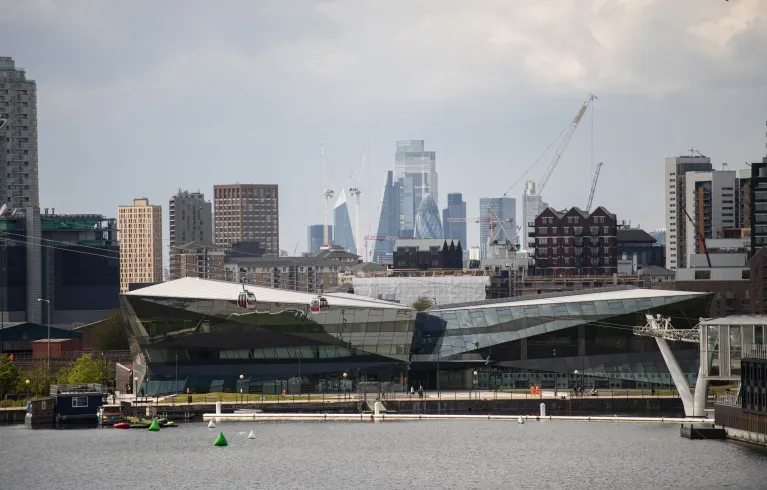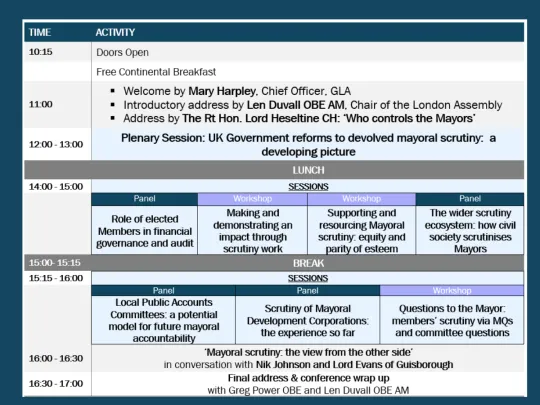
Holding Mayors to account: The future of scrutiny in devolved government
Date: Thursday 27th November 2025
Time: 11:00pm to 5:00pm
Cost: Free - registration required to attend in person
About the Event
The London Assembly and Centre for Governance and Scrutiny will hold a conference on 27 November 2025 on the future of Mayoral scrutiny.
The Government’s devolution agenda is moving at pace, creating new and upgraded mayoral systems across England. But as Mayors gain new powers and grow in influence, the question of how they are held to account is more important than ever.
We are welcoming those leading Mayoral scrutiny in an elected or official role, and colleagues from government, civil society and academia at this event.
This is your opportunity to hear from experts in the field and join a forum to share different perspectives on Mayoral scrutiny. As the Assembly marks the 25th Anniversary of London’s unique governance arrangement, the event will also examine how we can learn from this period of devolution and meet the opportunities and challenges ahead for partners across the UK.
Places are free but limited.
AGENDA

Please note, this is the current agenda however, it is subject to change. Attendees will be notified of changes.
Sessions at 14:00 and 15:00 will take place concurrently.
Room details will be shared with attendees on the day.
Panel and Session Blurbs
This session will take stock of the latest developments in national government reforms of mayoral powers and its expectations of devolved scrutiny. It will reflect on conversations surrounding the devolution bill in the House of Commons, as well as Government statements and the Scrutiny Protocol, to discuss views on the direction of travel for mayoral scrutiny.
Effective Mayoral scrutiny is underpinned by the presence of support from professional officers. Officers themselves take direction from members – who provide vital political leadership. Both groups of individuals need the capacity, and capability, to be able to carry out their roles effectively.
Although new remuneration arrangements help to ensure members’ commitment of time is recognised, councillors have a tough job juggling their CA scrutiny duties with those back at their home authority. From the officer perspective, CAs are fairly lean organisations with limited resource available for scrutiny support.
This workshop session will explore:
- Baseline expectations around resourcing – arising from the Scrutiny Protocol but also resting on assumptions about the tasks that scrutiny should be carrying out, now and in the future
- The different approaches taken across the country to supporting and resourcing the scrutiny function
- Some of the constraints and pressures that people have experienced – and where and how resourcing issues have been resolved or overcome
- Potential future models for support as scrutiny continues to evolve
Demonstrating the impact of scrutiny work has always been challenging – at national, regional and local level. This session will explore, practically, how reasonable it is that scrutiny is expected to demonstrate direct practical impact from all of its work, and what evidence to support a demonstration of impact might look like. It will also look at how success can be communicated to the wider organisation (and the wider area).
This session will consider what civil society monitoring mechanisms exist at devolved / mayoral levels, how officials draw upon these as external resources to enhance scrutiny work, and how the scrutiny environment can be further developed at mayoral levels.
The Government is seeking to reform local audit arrangements as part of its devolution plans, with further proposals also expected. The Local Audit Office is being established, while audit committees with independent members are to be mandatory for strategic authorities. This session will explore how elected Members can be supported to fulfil the key function of overseeing the financial governance of mayoral authorities and how their impact can be strengthened.
Mayoral Development Corporations have been a major focus of plans for forging ahead with urban regeneration and housing, with several large scale MDC announcements in the last few months. This session will explore how MDCs in Greater London have been scrutinised, by elected Members, communities and in internal governance, consider emerging practice in Combined Authorities, and consider how to make scrutiny of MDCs impactful and effective.
This workshop will invite contributions from different mayoral areas on their approach to Mayoral questions, requiring mayoral time, and supporting members to perform their scrutiny work.
Government has said it wishes to “explore” the idea of establishing local Public Accounts Committees. These are committees designed to look at the value for money of public spend across a whole area – taking a cross-cutting approach to scrutiny of the outcomes and delivery of Mayoral priorities in a partnership context.
This connects closely to a model of Mayoral accountability that moves beyond the bounds of the CA as an institution – reflecting the broader powers given to Mayors in the Devolution Bill to convene partners locally, and to work cross-border with other Mayors.
We will aim to tackle, through discussion between the panel and amongst those in the room, three key questions:
- Do we agree that the “tasks” we’ve described – a model of place-based cross-partnership scrutiny following the public pound, investigating value for money of investment – are ones that are necessary in the context of the wider governance and accountability environment?
- What might be the best structural model to carry out this function? Is a standalone “PAC” or similar the best approach – or should we be exploring how we can evolve existing scrutiny arrangements to deliver these new tasks?
- How much of this work will be about scrutiny of the Mayor directly, and how much of other individuals and agencies beyond the SA? Should scrutiny, LPACs or another model have increased powers in relation to a wider range of partners – and what might the relationship be with local authority scrutiny in this context?
- Depending on how we answer these questions, what are the practical implications for designing and setting up new arrangements for this form of scrutiny – the role of elected politicians, for the public, others – and what are the implications for the resourcing of those arrangements?
This final plenary discussion will reflect on how scrutiny feels from the perspective of those being scrutinised. It will cover questions of what kind of scrutiny is welcome, what is considered constructive and effective challenge, and how the executive-scrutiny relationship can work well.
Final addresses will reflect on the themes of the day. Greg Power will provide reflections on scrutiny in an international as well as UK context in 'Making scrutiny work: what the rules say and what they mean in practice'. Len Duvall OBE AM, Chair of the Assembly, will close the conference.
Common questions
You do not need to swap tickets prior to the event. You will be able to attend sessions of your choice, on the day.
If you wish to change your session, you will need to cancel your order and register for the right session. You can log into your Eventbrite account to do this.
We are experiencing some technical issues with our platform, which doesn’t currently allow us to reorganise the session blocks accurately on the ticket page.
Please use the above agenda image as your guide, to select the sessions you are interested in attending.
Please note, sessions at 14:00 and 15:00 will take place concurrently.
Yes, we will offer free breakfast and lunch on the day. Attendees are also welcome to make use of the café at City Hall and the food options in the surrounding area.
You can cancel your registration by logging into your Eventbrite account.
This should take a few seconds but if you need support, please refer to this guide.
-
All toilet facilities in City Hall are gender neutral. Accessible toilet cubicles are located on the same floor as the event space.
-
If you need a BSL Interpreter, please let us know by Friday 21st November.
-
Access to City Hall step-free.
-
Please find more details on accessibility at City Hall here
Need a document on this page in an accessible format?
If you use assistive technology (such as a screen reader) and need a version of a PDF or other document on this page in a more accessible format, please get in touch via our online form and tell us which format you need.
It will also help us if you tell us which assistive technology you use. We’ll consider your request and get back to you in 5 working days.